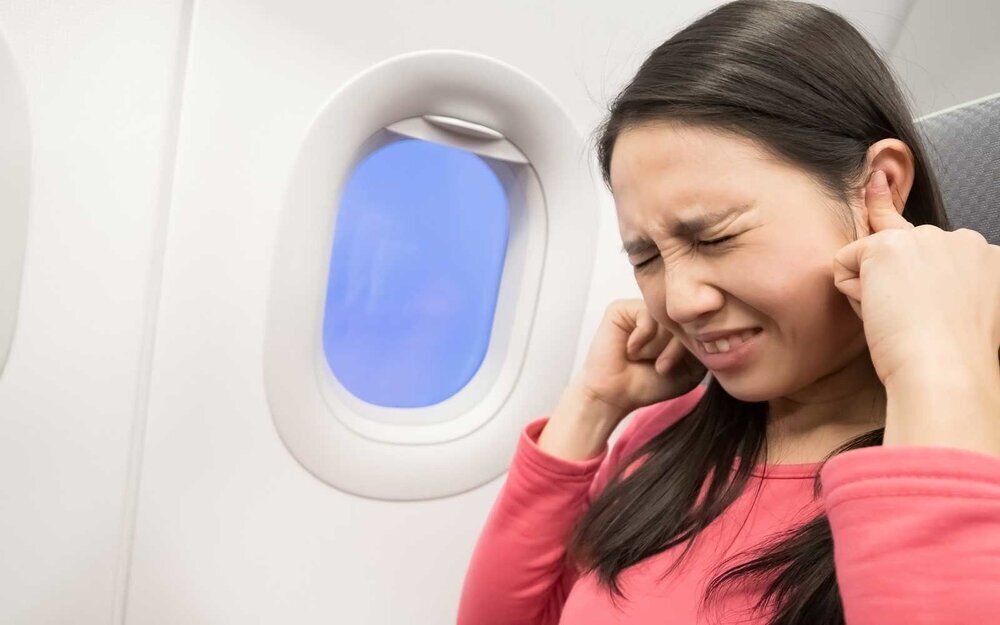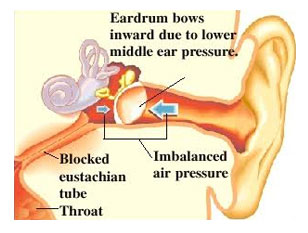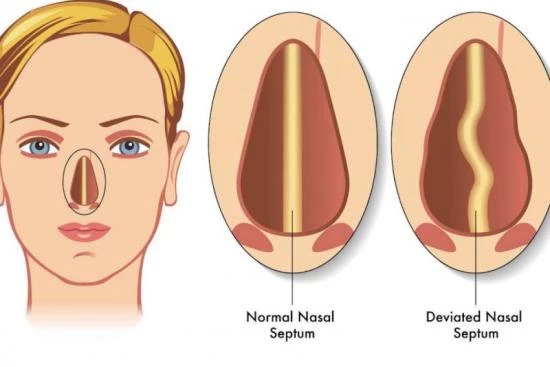Blocked Painful Ear and Pressure Tube Problems: Can I Fly?

Did you know that many people suffer from difficulty trying to pop their ears and keep trying to unblock their ears with all sorts of strange jaw or facial movements? The most important time that you really need to be able to equalise your ear pressures is during a flight, especially during flight descent and landing. The pressures building up behind your eardrums and back of the nose increase tremendously, pushing on your poor delicate eardrums to cause severe earache with a risk of eardrum rupture in the worst case scenario. This is why you should NOT fly if you are suffering a bad cold or the flu, or some “morning sinus” flareup causing your nose to be blocked and runny. All the extra soft tissue swelling and large amounts of sticky mucus secretions tend to block the back of your nose, where the narrow openings of your Eustachian pressure tubes lie, making it even more difficult for the Eustachian pressure tubes to “pop” open naturally as a pressure release outlet. Flight take-off isn’t usually the critical time for the Eustachian pressure tubes, for sure it is always the landing portion of the flight which poses a challenge to your ears and sinuses to cause severe ear pain, blocked ear sensation and sinus headaches.

As a busy ENT specialist in Singapore, we see many patients suffering from these recurrent blocked ear symptoms and here’s the interesting thing: Many patients with ear issues very often also suffer from blocked nose or nasal congestion, mouth-breathing, runny nose and sometimes, facial/sinus pain and headaches. The ear is linked to the back of the nose by the important Eustachian pressure tube. The Eustachian pressure tube is probably the most troublesome annoying structure in the ENT world because 1) it is a very deep structure which is difficult to access with instruments and 2) it is a capricious and unpredictable structure which causes all sorts of weird symptoms! Athough the more common problem is a blocked ear sensation and earache, people may also notice a strange echoey feeling inside their ears, humming low frequency sounds or tinnitus, mild low frequency hearing loss and popping, crackling noises due to the Eustachian tube acting up. When these symptoms occur, many people tend to keep repeating manoeuvres such as moving their jaw forward and backward because the jaw muscles are attached to the Eustachian tube structures, so they are doing this to attempt to open their Eustachian pressure tubes.
If you suffer recurrent sinus infections, nasal allergies or constantly have a blocked nose with difficulty breathing, then your Eustachian pressure tubes may be at risk of behaving abnormally, especially during flights, travelling in high speed lifts in tall buildings and fast trains/MRT going through tunnels. Some adults have had chronic Eustachian pressure tube problems all their lives, starting early in childhood but they never realised it was associated with their nasal issues. Over a long period of time though, your eardrums may gradually be retracted (“sucked in”) due to the abnormally negative pressures building up behind the eardrums as a result of the “closed off” sluggish Eustachian pressure tubes. If you cannot “pop” your ears easily, then that usually means your Eustachian tubes don’t work well, which may make it challenging for you to attempt activities such as scuba-diving, flying and mountain-climbing.
So what can you do to help your poor Eustachian tubes work better for you?
In the simplest case, I would suggest that you could try spraying your nose with a decongestant nasal spray easily bought over the counter at your local pharmacy such as Otrivine, Afrin, Oxymetazoline, Iliadin, Nazoline. But you should NOT be continuously depending on these nasal decongestant sprays daily on a regular basis, definitely do not spray daily for longer than 5-7 days at a time. Longterm use of these decongestant sprays is associated with a condition called rhinitis medicamentosa, where your nasal linings become thin and increasingly inflamed, with blood vessels growing abnormally, leading to increased risk of bleeding, high blood pressure (due to the systemic absorption of the drug into your body), and eventual much worse nasal congestion than before. I have had some patients who have been so dependent on these decongestant sprays that they cannot live or sleep without spraying their nose everyday on an increasingly frequent basis, sometimes for many years! If this sounds like you, then you need to see your friendly ENT specialist in Singapore for a nose checkup and the good news is that surgery to reduce or trim the overly inflamed swollen nasal tissue can help to improve your breathing through your blocked nose….and to STOP you from depending on those decongestant nose sprays!!!
Many people don’t realise that blocked ears, earache and problems with their Eustachian pressure tubes opening (or closing) are often related to nasal conditions including deviated nasal septum (crooked nasal bones inside), nasal allergies and sinus issues causing the swelling of soft tissue inside the nose. These ENT conditions are commonly chronic and recurrent, but not everyone knows that these in turn can affect the function of your ears and pressure tubes. Amazingly, some people have had a persistently blocked nose all their lives due to deviated nasal septum and rhinitis (nasal allergies) but they have forgotten how to breathe clearly and properly, so sadly, they dismiss this as “normal” (which it isn’t by the way!)
The funny thing is, there are helpful ways to sort our your ears, ear pressures and nasal conditions, especially if you find the usual medications unsuccessful in improving your blocked ears and/or nasal breathing. If you keep suffering a dry mouth, especially in the mornings, then that is a pretty good sign that you have likely been breathing through your mouth the entire night because your nose is blocked and congested! Quite frequently, patients who think they have sinus infections or “morning sinus” don’t turn out to have sinusitis at all, but have rhinitis or nasal allergies/sensitive nose problems. Once the ENT condition is diagnosed, the approach is very different as you do not need to have antibiotics and you probably should be thinking about having allergy testing to find out what is constantly irritating your poor congested nose and hence your ears! Did you also realise that suffering from a persistently blocked nose caused by deviated nasal septum, carries a higher risk of chronic or recurrent sinus infections?

Depending what the structural problems of your ears and nose are, some common procedures which might help include:
- Ventilation tubes for your ears (also known as grommets)
- Balloon dilation (stretching) of the Eustachian pressure tubes (done through the nasal passages safely)
- Septoplasty (correction of the deviated nasal septum to breathe clearly)
- Turbinoplasties (Reduction of the enlarged “sausages” inside your nose)
- Clarifix (“freezing” of the hypersensitive nerves which control mucus production in your congested nose)
- Adenoidectomy (Removal of enlarged lymph gland tissue blocking the back of the nose and Eustachian pressure tube openings)
- Nasal polypectomy and sinus surgery (Endoscopic or minimally invasive removal of nasal polyps, growths which can block your nose and sinuses) to improve the drainage of your blocked sinuses
The above list of common procedures to help clear your blocked nose and blocked nose certainly isn’t the end of it all. It really depends on the clinical findings during a careful examination by a good ENT specialist in Singapore. The treatment approach ultimately will be guided by what’s going on inside your nose and ears but you can rest assured that there is a very good chance you will be breathing better after that, in turn helping your poor blocked ear issues improve too!
Share this blog via:


